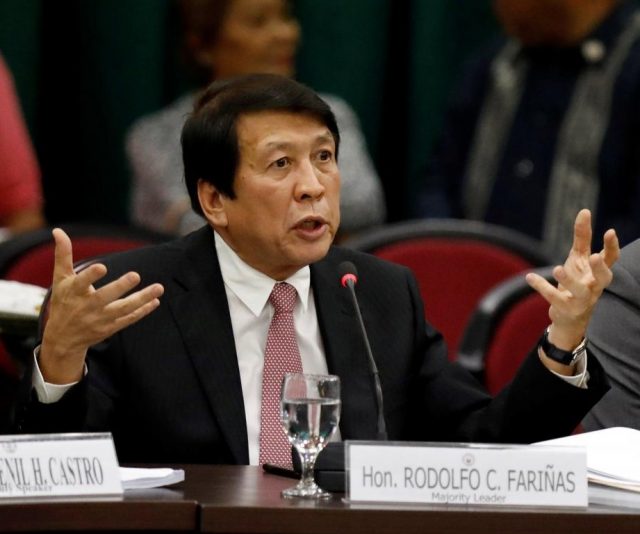MANILA, Philippines – Without the personal knowledge of the complainants, the allegations against Commission on Elections (Comelec) chairman Andres Bautista are all hearsay, Majority Leader Rodolfo Fariñas said Thursday.
Thus, Farinas said, the House is faced with a “novel” impeachment complaint, in which the allegations come mostly from Bautista’s wife, Patricia.
The view by Fariñas, a lawyer, could throw a monkey wrench into the impeachment complaint filed Wednesday (Aug. 23) by former congressman Jacinto Paras and lawyer Ferdinand Topacio on the grounds of betrayal of public trust and culpable violation of the Constitution as grounds.
However, Rep. Harry Roque, one of the three lawmaker-endorsers of the complaint, is unfazed.
Roque, an international and human rights lawyer, said that in case Patricia Bautista’s allegations would be dismissed in the impeachment proceedings, the complainants could raise on fallback cases: the Comelec chairman’s alleged negligence in the so-called “Comeleak” issue, where millions of voter data were compromised, and the technical glitch that occured during the previous national elections.
“Meron pang ibang basehan naman ang impeachment complaint, ‘yung tinatawag na Comeleak [There is another basis in the impeachment complaint which is the so-called Comeleak],” Roque said.
Roque cited the previous findings of the National Privacy Commission (NPC) that Bautista committed “gross negligence” of his obligations under the Data Privacy Act of 2012 when hackers defaced Comelec’s website and leaked the agency’s sensitive voter registration records last March 2016.
“Meron pa silang (referring to complainants) sinasabing isa pang dahilan. Naalala niyo ‘yung diumano sabi ni Commissioner Bautista? Parang technical glitch lamang pero sinasabi din ng mga complainant, naging isang ebidensya ng dayaan na nagbulag-bulagan si Chairman Bautista,” Roque said in a DZRH interview.
[They are also saying another reason. Do you remember what Commissioner Bautista allegedly said? He said it was a technical glitch but the complainants said it was evidence of election fraud, which Chairman Bautista ignored.]
“Kung lahat ‘yan ay mapapatunayan talaga namang nakakabahala [If all these are proven, then this is really alarming],” he added.
Unexplained wealth of P1 billion
Patricia accused her husband of amassing unexplained wealth of at least P1 billion.
According to Kabayan partylist Rep. Roque, Patricia’s affidavit was attached to the impeachment complaint, and the assurance she would be ready to attest to its contents was what motivated him to endorse the complaint.
In Fariñas’ view, however, if the complainants have no personal knowledge of the allegations, presenting Patricia during the impeachment hearings at the House of Representatives has its own problems. “Mahirap naman iyon, hearsay na nga iyon [That’s hard; it’s hearsay],” Fariñas said.
He admitted that he has yet to read the complaint, but reiterated that any such filing requires the complainants to have personal knowledge of the allegations.
Asked if Patricia can testify in the proceedings, he said, “Hindi naman siya ang [She’s not the] complainant.”
Novel issue
“This is a very novel issue because it’s the wife against the husband. We have a marital or spousal privilege that one spouse cannot testify against the other, except if the cause is one between the other. That’s in the rules of court, that’s why this is very novel,” he said.
Section 22 of Rule 130 of the Rules of Court states that “During their marriage, neither the husband nor the wife may testify for or against the other without the consent of the affected spouse, except in a civil case by one against the other, or in a criminal case for a crime committed by one against the other or the latter’s direct descendants or ascendants.”
Section 24 on the ‘Disqualification by reason of privileged communication’ states that “The husband or the wife, during or after the marriage, cannot be examined without the consent of the other as to any communication received in confidence by one from the other during the marriage except in a civil case by one against the other, or in a criminal case for a crime committed by one against the other or the latter’s direct descendants or ascendants.”
Meanwhile, Roque disputed Fariñas’ invocation pf the rules on spouses testifying against each other. He clarified that Patricia Bautista could testify against her husband in the proceedings, since Congress was not bound under the Rules of Court which barred spouses from testifying against each other.
The impeachment complaint will be sent to the Office of the Speaker, who will refer it to the Committee on Rules, headed by Farinas, within 10 days. The Rules committee will then refer it to the Committee on Justice for hearing to determine whether the complaint is sufficient in form and in substance.










